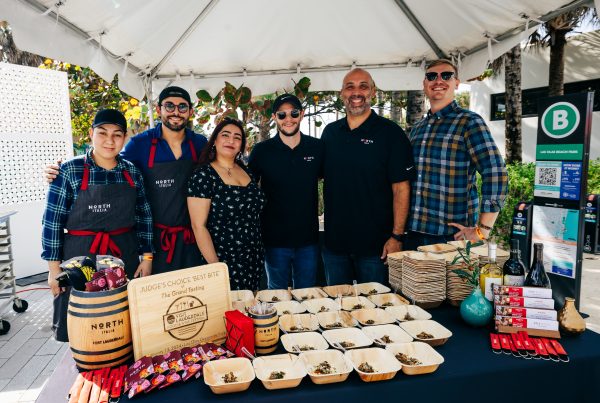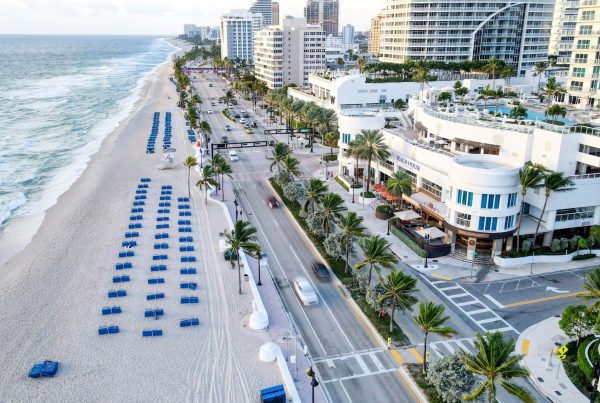The Center for Arts & Innovation (TCAI) is asking Boca Raton for the moon and stars and maybe a few planets.
Last week, TCAI proposed a rewrite of the 2022 agreement under which the group would lease city land next to the Mizner Park Amphitheater for its proposed performing arts center. The rewrite would relax most of the financial safeguards the city council imposed two years ago.
That council’s main concern was preventing a public bailout of the project, then estimated to cost $100 million. Council members wanted TCAI to have the money before construction began. Their nightmare scenario was a nearly complete facility that couldn’t be completed.
With that in mind, the city and TCAI agreed that the group would need to raise 25% of “hard costs” after one year and 25% more each year through 2026. The group met the first goal last year but missed this year by $18 million.
Council members said TCAI blindsided them with that revelation in October. CEO Andrea Virgin then told the council that TCAI wanted a new deal more aligned to what she called the realities of fundraising from large donors. Council members could have killed the deal because of the fundraising failure. Instead, they decided to wait for TCAI’s proposal.
Under that proposal, TCAI would need to have just 30% of construction costs by 2027 and 50% not until 2029. The goal would be 80% by 2031 and 100% when the center opened in 2032. In addition, the city would have to give TCAI a 90-day “cure period” if the group missed a fundraising deadline.
Given the council’s collective displeasure with TCAI, this is a jaw-dropping ask. TCAI essentially is saying to the city, “Trust us,” even after City Manager George Brown in October criticized TCAI for poor “accountability and transparency.”
As she did two months ago, Virgin tried to frame the proposal as a “win-win.” The rewrite is “not a negotiating of competing interests but rather an affirmation of [the city’s and TCAI’s] shared goals” for a “transformational” project.
To address Brown’s criticism, TCAI proposes to give the city audited financial statements each year and unaudited statements each May and November. The city would receive “annual briefings” on the project.
The seven-page proposal contains other requests, such as an exemption from downtown development limits. It provides more detail about different elements of the center. But the fundraising portion is the most significant.
Recalling the discussion from 2022, I can’t imagine the council at that time approving an agreement with these terms. Though council members expressed aspirational support for the center, protecting the city was paramount. Also, there still is no updated estimate of construction costs.
The proposal is so dramatic that some council members may wonder whether TCAI is looking for a way out, knowing that the council can’t accept it. Virgin said the proposal incorporates “lessons learned” about fundraising after two years, but council members have noted that TCAI’s plans for the project and its corporate structure change a lot. Brown complained at one point that the city didn’t even know who is on the group’s board.
There’s another practical problem. The amphitheater, which the city operates and which TCAI would renovate and make part of the center, needs work. Pushing out the timeline means delaying that upgrade if TCAI falls short.
It appears that the council has three options: accept the new terms and trust TCAI; make a compromise offer; or kill the deal, use city money to renovate the popular amphitheater and explore other uses for the land on Mizner Park’s northeast corner.
The council is expected to discuss the proposal at its Jan. 13 meeting.
Another Boca Raton High School swatting incident
For the second time in roughly two years, Boca Raton High School is the victim of a “swatting” incident, or putting in a fake call to emergency services.
At lunchtime Monday, the Boca Raton Police Department sent officers to the campus after reports of an “armed person” on campus. By 2 p.m., the department was reporting on its Facebook page that “all is clear” and that “nothing suspicious has been found.” School police are “investigating the anonymous threat.”
A similar false alarm happened in October 2022. The school went on lockdown after someone called about “a suspicious incident.” That time, it took about 20 minutes for police to declare the campus safe.

Perpetrators may consider swatting to be a humorous prank—it’s anything but. Law enforcement must respond. Then there’s the mental toll on students and faculty, especially in South Florida after the Marjory Stoneman Douglas High School shooting let 17 students and staff dead.
The crime—which the Legislature has made a felony in most cases—is spreading, and there are serial offenders. A California teenager faces sentencing in February after making nearly 400 swatting calls nationwide between August 2022 and January 2024. In September, after 54 incidents, the Volusia County sheriff threatened “perp walks” for swatters.
I’ll have more if investigators make an arrest.
Boca-based private prison company facing lawsuits
Boca Raton-based GEO Group faces two lawsuits by families of inmates who were killed this year at the South Bay Correctional Facility in western Palm Beach County.
GEO operates the state prison as it does similar facilities in Florida, the country and the world. The families of Allec Garcia and Antron Griffin allege that the prison did not take “reasonable care” to protect the inmates. GEO’s subsidiary, GEO Secure Services, operates South Bay.
The lawsuit cites 17 examples between 2009, when GEO took over management, and this year—before Garcia and Griffin died—of inmates and staff dying or being “catastrophically injured.” Kimberly Wald, the families’ attorney, cited “a pattern of unnatural deaths,” including from suicide. “There’s a very disturbing history.” Wald said GEO “should have known” that the men “were being threatened.”
Florida and other states began contracting with private operators three-plus decades ago to save money. Critics have said that companies skimp on staff and safety measures to maximize profit. Research shows that rates of violent incidents at private prisons can be nearly 50% higher than at their public counterparts.
GEO also has drawn criticism and lawsuits for its operation of federal immigration detention centers. That issue arose in 2013, when Florida Atlantic University trustees awarded GEO naming rights at FAU’s football stadium for $6 million. The deal fell apart after hostile student reaction, and the president resigned. Some market analysts have said the company and other private prisons could benefit if President-elect Donald Trump follows through on his campaign pledge to deport millions of immigrants.
GEO has said the deaths of Garcia and Griffin are under investigation.
Traffic cameras in Delray Beach school zones
Delray Beach will install traffic cameras in school zones.
In a presentation to the city commission, Police Chief Russ Mager said the technology will be much more efficient than posting officers for eight hours a day in the city’s 20 school zones. He noted that some don’t even have crossing guards.
These cameras are separate from the red-light cameras at intersections that have become so controversial. After establishing statewide rules for those programs, the Legislature imposed further restrictions this year.
In 2023, the Legislature allowed cameras in school zones. The cameras can come on 30 minutes before class starts and must go off 30 minutes after the school day ends. Mager pointed out that the fine is $100, compared to $300 for a ticket from an officer, and no points go onto the driver’s license. City Manager Terrence Moore called it “a great idea.”
A private company will operate the cameras in Delray Beach. Under the law, cities must conduct a public awareness campaign before the program begins. The commission also must approve an ordinance governing the program. That is expected to happen next month.
Correction
I wrote last week that Cameron Duncan will be the new chair of Florida Atlantic University’s nursing school. Dr. Duncan will be the dean.







